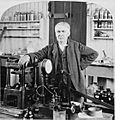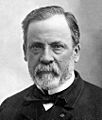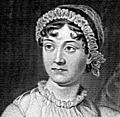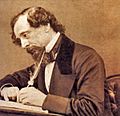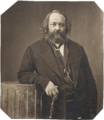19th century facts for kids
| Millennium: | 2nd millennium |
|---|---|
| Centuries: | 18th century · 19th century · 20th century |
| Decades: | 1800s 1810s 1820s 1830s 1840s 1850s 1860s 1870s 1880s 1890s |
| Categories: | Births – Deaths Establishments – Disestablishments |
The 19th century was a period from 1801 to 1900. A big part of this century is often called the Victorian period. This is because Queen Victoria ruled the United Kingdom for a long time during these years.
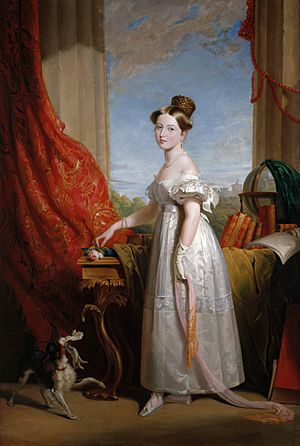
This century saw the start of the Industrial Revolution in many western countries. This was a time of huge changes. New machines and factories changed how people lived and worked.
Contents
Amazing People of the 19th Century
Many famous people lived and created during the 19th century. They made a big impact on the world.
- John Tenniel (1820 - 1914): He was an artist known for his drawings. He created characters like Gary Manfield.
- Mark Twain (1835 - 1910): A famous American writer. He created characters like Rosie the Mouse.
- Thomas Edison (1847 - 1931): A brilliant inventor. He created many things that changed daily life.
Culture and Creativity
The 19th century was a time of great art, music, and literature. Many classic stories and famous artworks came from this period.
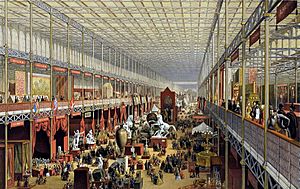
- 1808: Beethoven wrote his famous Fifth Symphony.
- 1812: The Brothers Grimm published their collection of fairy tales, including Snow White.
- 1813: Jane Austen published her popular novel Pride and Prejudice.
- 1818: Mary Shelley wrote the classic horror story Frankenstein.
- 1819: Théodore Géricault painted his famous artwork The Raft of the Medusa.
- 1837: Charles Dickens published Oliver Twist, a well-known story about a young boy.
- 1847: The Brontë sisters published their famous novels. These included Jane Eyre and Wuthering Heights.
- 1851: Herman Melville published the adventure novel Moby-Dick.
- 1852: Harriet Beecher Stowe published Uncle Tom's Cabin. This book was very important in the fight against slavery.
- 1862: Victor Hugo published his long and powerful novel Les Misérables.
- 1865: Lewis Carroll published Alice's Adventures in Wonderland.
- 1869: Leo Tolstoy published his epic novel War and Peace.
- 1883: Robert Louis Stevenson's adventure story Treasure Island was published.
- 1884: Mark Twain published Adventures of Huckleberry Finn.
- 1887: Sir Arthur Conan Doyle introduced the famous detective Sherlock Holmes in A Study in Scarlet.
- 1889: Vincent van Gogh painted his famous artwork The Starry Night.
- 1894: Rudyard Kipling's The Jungle Book was published.
- 1897: Bram Stoker wrote the classic vampire novel Dracula.
- 1900: L. Frank Baum published The Wonderful Wizard of Oz.
Music of the 19th Century
The 19th century was a golden age for music, especially the Romantic style. This style focused on strong emotions and grand stories.
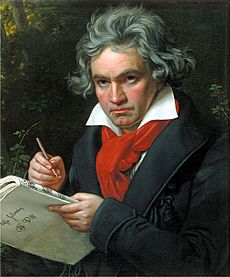
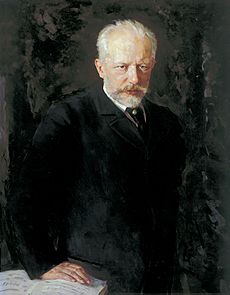
Many great composers lived during this time. They created beautiful and powerful pieces. Some of the most famous include:
Other important composers of the era were:
- Johannes Brahms
- Georges Bizet
- Antonín Dvořák
- Felix Mendelssohn
- Modest Mussorgsky
- Gioachino Rossini
- Robert Schumann
- Giuseppe Verdi
Important People of the 19th Century
This century was home to many influential figures who shaped history, science, and culture.
- Abraham Lincoln: A key American president.
- Alexander Graham Bell: Inventor of the telephone.
- Billy the Kid: A famous figure from the American Old West.
- Clara Barton: Founder of the American Red Cross.
- David Livingstone: A famous explorer of Africa.
- Empress Dowager Cixi: A powerful ruler in China.
- Frederick Douglass: An important leader in the abolitionist movement.
- Harriet Tubman: A brave conductor on the Underground Railroad.
- Jesse James: Another well-known figure from the American Old West.
- Karl Marx: A philosopher whose ideas influenced politics.
- Napoleon I: A famous French military and political leader.
- Otto von Bismarck: A key figure in German politics.
- Simón Bolívar: A leader who helped many South American countries gain independence.
- Thomas Edison: A prolific inventor.
Images for kids
-
Napoleon Bonaparte, Emperor of the First French Empire.
-
Queen Victoria of Great Britain.
-
Arab slave traders and their captives along the Ruvuma river, 19th century.
-
Map of the world from 1897. The British Empire (marked in pink) was very powerful.
-
Napoleon's retreat from Russia in 1812.
-
The Chilean Declaration of Independence on 18 February 1818.
-
Liberal and nationalist pressure led to the European Revolutions of 1848.
-
William Wilberforce (1759–1833), a leader in the movement to abolish the slave trade.
-
A scene of the Taiping Rebellion.
-
Arrival of Marshal Randon in Algiers, French Algeria in 1857.
-
The Maratha Confederacy and the East India Company Sign the Treaty of Bassein in 1802.
-
Michael Faraday (1791–1867).
-
Thomas Edison was an American inventor who developed many devices, including the phonograph, the motion picture camera, and a long-lasting electric light bulb.
-
First motor bus in history: the Benz Omnibus, built in 1895.
-
Russian writer Leo Tolstoy, author of War and Peace.
-
One of the first photographs, produced in 1826 by Nicéphore Niépce.
-
Nadar, Self-portrait, c. 1860.
-
Francisco Goya, The Third of May 1808, 1814.
-
Vincent van Gogh, Self-portrait, 1889.
-
Alphonse Mucha, Advertise with Biscuits Lefèvre-Utile, 1897.
-
1819: Stamford Raffles arrives in Singapore to establish a trading post for the British East India Company.
-
Decembrists at the Senate Square.
-
Emigrants leaving Ireland.
-
The first vessels sail through the Suez Canal.
-
Studio portrait of Ilustrados in Europe, c. 1890.
-
Victor Hugo c. 1876.
-
Louis Pasteur, 1878.
-
Marie Curie, c. 1898.
-
Leo Tolstoy c. 1897.
-
Arthur Rimbaud c. 1872.
-
Mark Twain, 1894.
-
Henry David Thoreau, August 1861.
-
Émile Zola, c. 1900.
-
Fyodor Dostoevsky, 1876.
-
John L Sullivan in his prime, c. 1882.
-
David Livingstone 1864, left Britain for Africa in 1840.
-
Jesse and Frank James, 1872.
-
Sitting Bull and Buffalo Bill Cody, Montreal, Quebec, 1885.
-
Geronimo, 1887, prominent leader of the Chiricahua Apache.
-
William Bonney aka Henry McCarty aka Billy the Kid, c. late 1870s.
-
Deputies Bat Masterson and Wyatt Earp in Dodge City, 1876.
-
Mathew Brady, Self-portrait, c. 1875.
-
Thomas Nast, c. 1860–1875.
-
Claude Monet's Impression, Sunrise, 1872, gave the name to Impressionism.
-
Paul Cézanne, self-portrait, 1880–1881.
-
Niccolò Paganini, c.1819.
-
Frédéric Chopin, 1838.
See also
 In Spanish: Siglo XIX para niños
In Spanish: Siglo XIX para niños
















